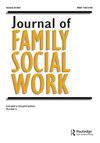家庭知情护理对参加医疗补助管理护理的残疾人的影响
IF 0.7
Q3 SOCIAL WORK
引用次数: 0
摘要
摘要:本文探讨了家庭知情护理对医疗补助计划中残疾参保人未满足的医疗服务和长期服务与支持(LTSS)需求的影响,以及家庭成员对这些参保人在医疗补助管理下获得的服务的评价。家庭在残疾人的生活中扮演着重要的角色。然而,人们对残疾人未得到满足的需要与他们的家庭告知他们得到照顾的程度之间的关系了解甚少。对700份调查进行了回归分析,这些调查部分是由残疾医疗补助计划参保者完成的,部分是由家庭成员完成的。在控制了参保者和家庭人口统计/因素以及家庭参与日常活动后,报告家庭知情护理水平较高的家庭成员对参保者获得的服务有更高的评价,这些参保者报告的未满足的医疗和长期服务保障需求较少。研究结果强调了将家庭成员纳入社会政策和项目中的医疗保健决策的重要性,例如医疗补助管理式医疗。需要进一步的研究,以促进家庭知情护理的最佳做法,当成人残疾的愿望。本文章由计算机程序翻译,如有差异,请以英文原文为准。
Impacts of family-informed care for people with disabilities enrolled in Medicaid managed care
ABSTRACT This paper explores the impact of family-informed care on Medicaid enrollees with disabilities’ unmet needs for medical services and long-term services and supports (LTSS) and family members’ appraisal of the services received by those enrollees within a Medicaid managed care program in one Midwestern state. Families play an important role in the lives of people with disabilities. However, little is understood about the relationship between unmet needs of people with disabilities and the degree to which their family informs the care they receive. Regression analyses were performed on 700 surveys that were partially completed by a Medicaid enrollee with a disability and partially by a family member. After controlling for enrollee and family demographics/factors and family involvement in day-to-day activities, family members who reported higher levels of the family-informed care had higher appraisals of the services received by enrollees and those enrollees reported fewer unmet medical and LTSS needs. Findings highlight the importance of including family members in healthcare decision-making within social policies and programs, such as Medicaid managed care. Additional research is needed to promote best practices in family-informed care when desired by adults with disabilities.
求助全文
通过发布文献求助,成功后即可免费获取论文全文。
去求助
来源期刊

Journal of Family Social Work
SOCIAL WORK-
CiteScore
2.10
自引率
0.00%
发文量
4
期刊介绍:
Each issue of the Journal of Family Social Work contains peer reviewed research articles, conceptual and practice articles, creative works, letters to the editor, and book reviews devoted to innovative family theory and practice subjects. In celebrating social workers" tradition of working with couples and families in their life context, the Journal of Family Social Work features articles which advance the capacity of practitioners to integrate research, theory building, and practice wisdom into their services to families. It is a journal of policy, clinical practice, and research directed to the needs of social workers working with couples and families.
 求助内容:
求助内容: 应助结果提醒方式:
应助结果提醒方式:


